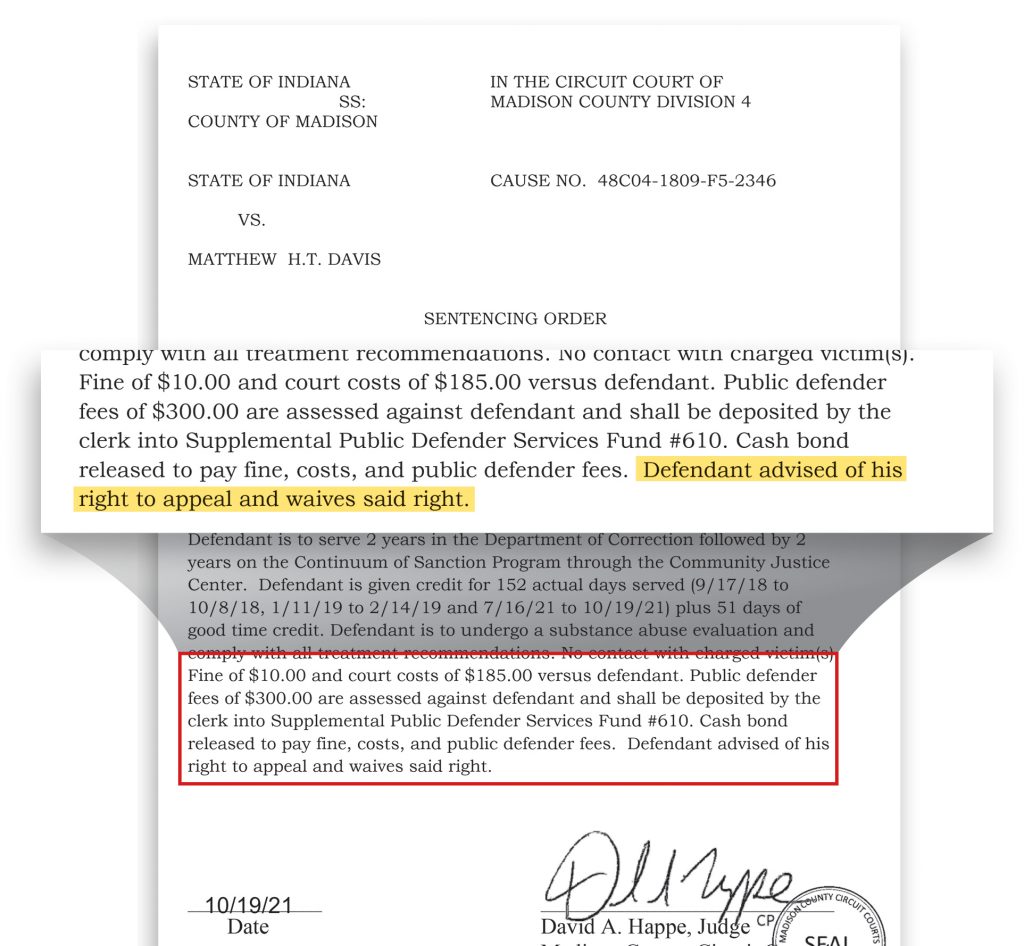Subscriber Benefit
As a subscriber you can listen to articles at work, in the car, or while you work out. Subscribe NowA series of cases and decisions in Indiana’s appellate courts have left some defense attorneys and at least one judge hoping for more clarity on what rights to appeal a defendant retains after they’ve agreed to a plea deal.
Even Indiana Chief Justice Loretta Rush wrote in a recent dissent that the state’s high court should take an opportunity to provide more instruction on what she called a “recurring legal issue that will continue to impact defendants across our state.”

And in Madison County, where Judge David Happe has found himself near the center of a couple recent cases involving appeal waivers in plea agreements, the longtime judge said he’s stopped giving defendants advisements on appeal when there’s a plea agreement in place because it’s not clear what an appropriate advisement would be.
In 2022, there were 110,805 criminal cases resolved through guilty pleas and admissions, according to data from the Indiana Office of Court Services. That represents about 42% of all disposed criminal cases. Less than 2% were decided by a jury or bench trial.
It isn’t clear exactly how many of those plea agreements contain an appeal waiver.

Jim Oliver, deputy director of criminal law at the Indiana Prosecuting Attorneys Council, said it’s “fairly common” for plea agreements to include a waiver, especially when there is a sentencing range that the judge is allowed to consider through the plea.
The purpose of the waivers, he said, is to provide a level of certainty and finality — but some say that’s exactly what is missing.
‘Perpetually an issue’
Suzy St. John, a staff attorney with the Indiana Public Defender Council, said waiver provisions in guilty pleas seem to be “very prevalent” and estimated there’s at least a 50% chance that a plea deal will contain a waiver.
St. John co-authored an amicus brief to the Indiana Supreme Court in a case involving a man who was convicted on theft-related charges and tried to appeal his sentence after signing a plea agreement that waived his right to appeal.

The brief says the Court of Appeals of Indiana dismissed the case — Matthew H. Thomas Davis v. State of Indiana, 22S-CR-253 — before appellate counsel had a chance to review the record and identify possible issues for appeal.
But a split Indiana Supreme Court likewise dismissed the appeal in May, then reaffirmed on rehearing this month.
In part, the brief cited developments in the years since the high court ruled defendants can waive their right to appeal.
The brief pointed to the U.S. Supreme Court case Garza v. Idaho, 139 S. Ct. 738 (2019), in which the court held that a defendant is denied effective assistance of counsel under the Sixth Amendment when counsel doesn’t file a notice of appeal when the defendant requests it — even with the existence of an appeal waiver.
In Indiana, the decision in Creech v. State, 887 N.E.2d 73 (Ind. 2008), established that defendants can waive their right to appeal.
Part of the impetus for the Creech decision, St. John said, was efficiency.
The court’s opinion in Creech said a defendant’s appeal waiver “can be of substantial benefit to both the defendant and society,” in part because it would free up time for prosecutors.
“I just see this being perpetually an issue,” St. John said. “And I don’t know that there’s any sort of solution for it. I think we’ll kind of carry on like this.”
Brian Karle, an attorney at Ball Eggleston P.C. in Lafayette, said he can think of a solution: overruling Creech.
Karle co-authored the amicus brief in the Davis case. He also represented a man who had his sentencing appeal dismissed by the Court of Appeals, which found he waived his right to review when he entered into a plea agreement.
In a petition to transfer the case — Justin A. Warren v. State of Indiana, 22A-CR-1653 — Karle and Logansport attorney Mark Leeman wrote that Creech is “unworkable in Indiana.”
“The decision has created an ethical quagmire,” the petition says. “Its predictions of efficiency have never come to fruition.”
The Supreme Court denied transfer.
Karle said he’s handled six or seven similar cases over the last seven years of doing appellate work.
Overruling Creech would be a “very big step,” Karle admitted, because he said it would get rid of the inefficiencies and confusion when it comes to enforcing appeal waivers.
‘I really would appreciate some clear guidance’
Judge Happe said he feels conflicted about what he’s supposed to do in his court.
Happe was the judge in a case that involved a man charged with stalking and battery. The man entered a plea agreement that included an appeal waiver.Happe later denied the man’s petition for permission to file a belated notice of appeal.
But the Court of Appeals reversed Happe in Trey M. Fields v. State of Indiana, 20A-CR-1799. Happe said that implied in the ruling was a conclusion that he erred by not advising the defendant of his right to appeal.
Based on that, Happe said he began advising defendants that despite the waiver in their plea agreements, they still had a limited right to appeal his sentencing decisions.
Then came Matthew Davis.
Happe advised Davis of his right to appeal despite the waiver, but Davis’ appeal was dismissed, and the Indiana Supreme Court characterized Happe’s advisement as a misstatement.
Now, if there’s a plea agreement with a waiver, Happe said he isn’t giving an advisement.
He said it’s clear a limited right to appeal exists, but trying to counsel on that would be “very difficult.”
“I really would appreciate some clear guidance from the Supreme Court … about what would be the appropriate advisement at this point,” the judge said.
Paul Podlejski represented Davis in the case, which he said was the first time the issue had come up for him.
Podlejski said he filed the notice of appeal but didn’t have time to read the transcript or identify appellate issues before the Court of Appeals dismissed the case.
“What that fails to recognize is there could be a whole bunch of other issues that fall outside of the waiver provision that was in there,” he said.
‘Generic, ambiguous waivers’
Those hoping the appellate courts will offer more guidance on the issue may have an ally in Chief Justice Rush.
Rush voted recently to grant transfer to the Warren case and joined Justice Christopher Goff’s dissenting opinion in the Davis case, in which Goff wrote that “because the appeal waiver can be severed from the rest of Davis’s plea agreement, he should be allowed his appeal, rather than having to make an ‘all or nothing’ challenge to his plea.”
Rush also dissented from the high court’s decision to deny transfer to Lindsay E. Grate v. State of Indiana, 22A-CR-2224.
In that case, the defendant, Lindsay Grate, pleaded guilty to felony dealing in methamphetamine. The plea deal included an appeals waiver, but Rush wrote Grate did not knowingly or voluntarily waive her constitutional right to appeal her 48-year sentence.
“Grate’s plea agreement waiver is virtually indistinguishable from the generic, ambiguous waivers we have previously found insufficiently explicit to establish a knowing and voluntary waiver — transfer is warranted on that basis alone,” Rush wrote.
The dissent earned at least one fan.

Jim McEntarfer represented Grate in the case and said it’s not common for him to come across issues like that, though he’s talked to other attorneys who do run into those problems.
There needs to be more clarity when defendants enter a plea agreement that contains a general waiver of their right to appeal, McEntarfer said.
“We all like certainty,” he said. “We all like bright lines to be drawn. … Unfortunately, there is a lot in the law that is gray or very fact-sensitive.”
As for Rush’s dissent, McEntarfer said it was well thought out.
“And,” he said, “it was strong.”•
Please enable JavaScript to view this content.

